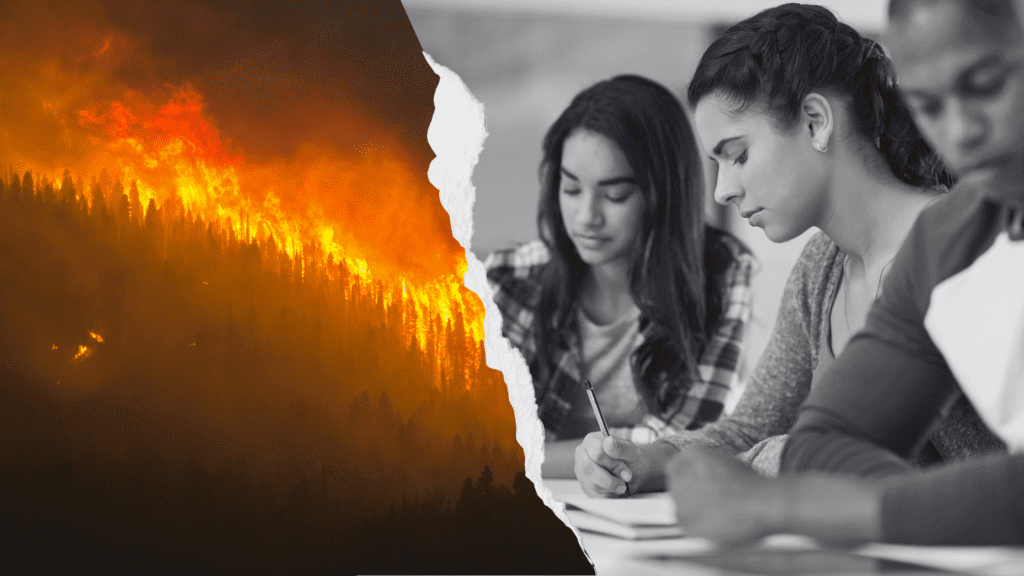
In recent years, California has become ground zero for climate-related natural disasters in the U.S. from out-of-control wildfires and violent flooding to devastating drought. To equip students with the knowledge to better understand—and take action—in the face of climate change, the University of California (UC) launched a multidisciplinary curriculum, Bending the Curve, in 2017.
The evolving curriculum, covering more than 50 topic areas, explores the science of climate change, its impacts, carbon-reducing solutions, and steps students can take to lead climate action in their communities. The course is currently being taught on seven UC undergraduate campuses—with content being distributed through other universities in the U.S. and globally.
To what extent is the curriculum impacting student decision-making and pro-environmental behavior? And could a mindfulness component help strengthen, not only students’ connection to the environment, but their resilience to climate stress? These are questions driving neuroscientist and mental health researcher Jyoti Mishra, who was awarded a 2021 Mind & Life Francisco J. Varela Grant to dig deeper.
“We live in a world where the environment, and what we’re doing to it, is impacting us directly,” she says. “I want to build awareness that we have the ability to make a positive impact, starting with a positive mindset. It all begins with the inner work we do with ourselves.”
“I want to build awareness that we have the ability
to make a positive impact, starting with a positive mindset.
It all begins with the inner work we do with ourselves.”
—Jyoti Mishra
An Associate Professor in the department of Psychiatry at UC San Diego, Jyoti knows all-too-well the difference mindfulness can make in supporting student well-being. She moved to the U.S. from India in 2003 “with two suitcases” to attend graduate school in neuroscience. Adjusting to a new life, combined with academic pressure, wasn’t easy. “I got stressed and depressed,” says Jyoti, who started to pursue mindfulness and breathwork practices that have only deepened over time. “Now, whenever stress enters my life, I know the tools are there.”
Jyoti is also passionate about harnessing the power of technology to make mindfulness solutions more widely accessible. She founded and now directs the Neural Engineering and Translational Labs (NEATLabs). The lab engineers evidence-based mental health technologies such as digital mindfulness training developed for use with both children and adults. The training is accessed via smartphone. Users engage in a game-like experience and practice mindful focus for 5- to 10-minutes per session for a maximum of 60 sessions over a recommended three months. The training integrates empathy and compassion instruction—promoting compassion for self, loved ones, and all others—as well as appreciation for our common humanity.
Jyoti’s interest in studying the impact of climate crises on mental health came to a head in 2018, when more than 30,000 people lost their homes and 86 people died, during the Camp Fire in Paradise, CA. A year later, she collaborated on a research study into the mental health impacts of wildfires focusing on Paradise residents. The study with 725 participants found an increased incidence of post-traumatic stress, anxiety, and depression in wildfire exposed individuals. The same study found mindfulness to be highly protective against mental health challenges.
With this knowledge, Jyoti and her team began actively pursuing the goals of their Mind & Life-supported research in 2022. To date, the team has collected assessments from 197 students prior to their enrollment in Bending the Curve, with 70% of students also providing post evaluations. The team is now assessing changes among students related to their climate change beliefs, attitudes, pro-environmental behavior, stress, and well-being, along with calculations of any reduction in each student’s carbon footprint. A second year of student data collection is now underway.
Early results suggest that climate change education can significantly impact climate change knowledge, beliefs, and attitudes in students, as well as pro-environmental behavior such that there is a significant reduction in individual carbon footprint. However, the psychological aspects of stress, resilience, and well-being do not show large magnitude changes by climate education alone.
While the team had planned to deliver digital mindfulness sessions to students, in reality only a small minority of students (10%) set aside extra time for the mindfulness sessions. This can be largely attributed to the fact that the mindfulness component was an ‘add on’ and not integrated within the curriculum, Jyoti explains. Given the modular nature of the course, and variations in how individual professors across the UC system deliver the material, it was challenging to gain student buy-in for the independent mindfulness practice.
As an alternative, Jyoti has now developed a mindfulness integrated climate education module to be included in Bending the Curve, starting in the Fall of 2023. The module covers four topic areas, including how climate change affects mental health, the impact of climate change-induced stress on communities (e.g., increasing rates of violence and suicide), what communities are doing to counteract these effects (e.g., providing access to clean energy and transportation, along with greening public spaces to promote well-being), and finally, individual behaviors that can protect well-being in the context of climate stressors, including mindfulness, especially when practiced in nature. This one-hour lecture has been pre-recorded and will be made available, along with a digital textbook chapter, across the UC system, wherever Bending the Curve is being offered. Professors at each location can then adapt the content to meet their needs.
These efforts stimulated Jyoti’s interest in the new UC Center for Climate, Health, and Equity. As part of this Center, Jyoti now co-directs the UC Climate Change and Mental Health Initiative, alongside contemplative health psychologist and stress researcher Elissa Epel. Together, Jyoti and Elissa are developing psychological resilience focused curricula, to be disseminated throughout the UC system, serving as a toolkit to meet urgent student needs to relieve climate anxiety and distress, and to stimulate a positive mindset towards climate action.
While Jyoti found it necessary to modify how she carried out her initially proposed goals through the Mind & Life grant, her new education initiatives promise even greater potential impact. She plans to continue to rigorously evaluate the impact of these new initiatives per the methods originally proposed in her Mind & Life Varela grant. “The grant from Mind & Life is seeding work in new directions that in the future will benefit students even more deeply,” she says.
Suggested Links:
- Learn more about Mind & Life Grants.
- Check out a new book by Mind & Life President Susan Bauer-Wu, A Future We Can Love: How We Can Reverse the Climate Crisis with the Power of Our Hearts & Minds.
- Listen to the Mind & Life podcast as mindful policy advocate Jamie Bristow shares his work related to Policy, Practice and Planet.
- Read diverse perspectives on strengthening the human-earth connection featured on Insights: Journey into the Heart of Contemplative Science.
- Enroll in Mind & Life’s online climate course, The Mind, the Human Earth Connection, and the Climate Crisis.


